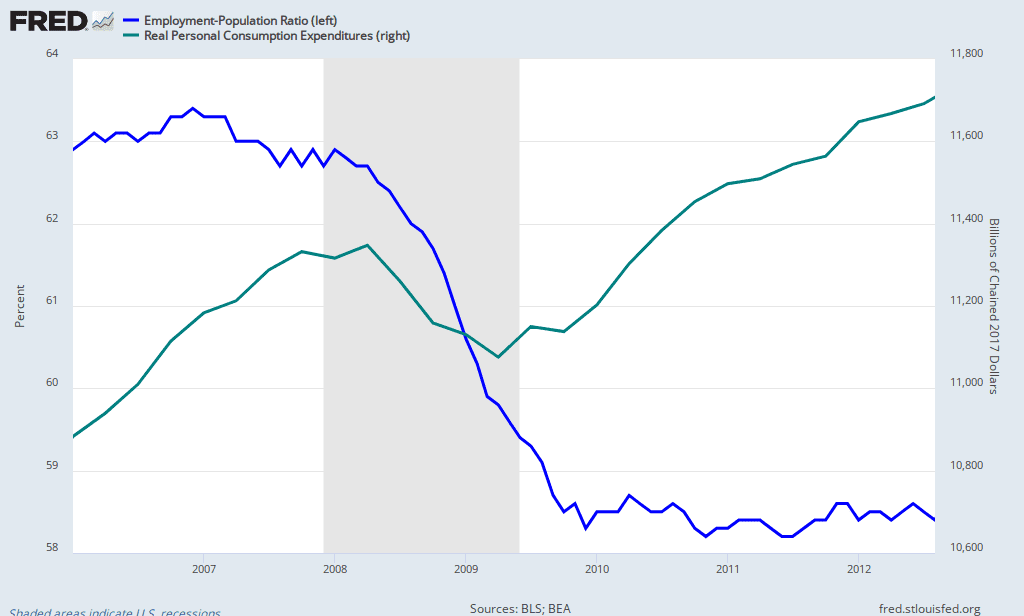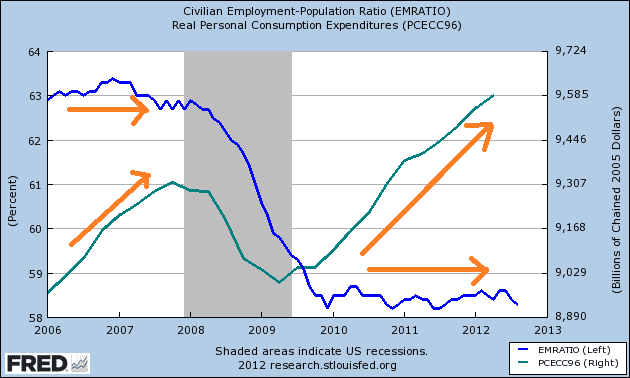Ok, this is a pet peeve of mine. A few times now, the Labor Force has gone down, and that has caused the Unemployment rate (Unemployed/Labor Force) to go down as well. Many in the media report that as "people giving up looking for work" which is misleading.
Let's look at the Labor Force Flows, the gross changes and see what happened.
In the week ending July 14, 2012, there were 142,220,00 Employed and 12,794,000 Unemployed, for a Labor Force of 155,013,000
By the week ending August 18, 2012 the following changes occurred:
Employed: 2,117,000 people lost/left their jobs and started looking for a new job (became Unemployed). No loss to Labor Force.
4,100,000 lost/left their job and did not start looking for work (includes retirees, students, injuries/illlness, just hadn't started looking yet, etc). So -4,100,000 to the Labor Force.
24,000 died, left the country, entered active duty military, went to prison, or were institutionalized (left the population). So another -24,000 to the Labor Force for a total of -4,124,000 from the Labor Force.
At the same time,3,789,000 people who hadn't been looking for a job started looking and found work. And 55,000 people joined the population and got a job (turned 16, immigrated, left the military/prison/institution). For a gain of +3,844,000 to the Labor Force as Employed.
Unemployed (looking for work):
2,278,000 found jobs and became Employed (no change to the Labor Force).
2,909,000 did not look for work between the surveys (illness, injury, waiting to start new job, familiy/transportation issues, decided didn't need a job, gave up in discouragement) for a change of -2,909,000
2,000 died, left the country, entered active duty military, went to prison, or were institutionalized (left the population). So total of -2,911,000 from the Labor Force.
At the same time, 2,813,000 people who hadn't been looking for work started looking, and 9,000 joined the population looking for work (turned 16, immigrated, left the military/prison/institution), for a gain of +2,822,000 to the labor force.
So adding things up, 4,395,000 people just switched status within the labor force...employed to unemployed or unemployed to employed.
7,035,000 left the labor force (4,124,000 from Employed and 2,911,000 from Unemployed)
6,602,000 joined the labor force (3,844,000 to Employed and 2,822,000 to Unemployed).
Net change of -369,000 to the Labor Force.
Yes, that can be kind of confusing and complicated. That's kind of my point. While certainly some of those 2.9 million who stopped looking for work "gave up," most of them stopped looking for other reasons than discouragement (the number of discouraged actually went down) and most of the people who left the labor force had been Employed and didn't look at all during the 4 weeks between surveys..so hardly "gave up looking."
In short, the Labor Force dropped, which is not good, causing the UE rate to go down for the wrong reasons. But it is Inaccurate to portray that as "people giving up looking," which implies discouragement. Someone who stopped looking for work in order to look after the kids, or who hurt themselves and couldn't work so didn't look cannot accurately be called "giving up."
Let's look at the Labor Force Flows, the gross changes and see what happened.
In the week ending July 14, 2012, there were 142,220,00 Employed and 12,794,000 Unemployed, for a Labor Force of 155,013,000
By the week ending August 18, 2012 the following changes occurred:
Employed: 2,117,000 people lost/left their jobs and started looking for a new job (became Unemployed). No loss to Labor Force.
4,100,000 lost/left their job and did not start looking for work (includes retirees, students, injuries/illlness, just hadn't started looking yet, etc). So -4,100,000 to the Labor Force.
24,000 died, left the country, entered active duty military, went to prison, or were institutionalized (left the population). So another -24,000 to the Labor Force for a total of -4,124,000 from the Labor Force.
At the same time,3,789,000 people who hadn't been looking for a job started looking and found work. And 55,000 people joined the population and got a job (turned 16, immigrated, left the military/prison/institution). For a gain of +3,844,000 to the Labor Force as Employed.
Unemployed (looking for work):
2,278,000 found jobs and became Employed (no change to the Labor Force).
2,909,000 did not look for work between the surveys (illness, injury, waiting to start new job, familiy/transportation issues, decided didn't need a job, gave up in discouragement) for a change of -2,909,000
2,000 died, left the country, entered active duty military, went to prison, or were institutionalized (left the population). So total of -2,911,000 from the Labor Force.
At the same time, 2,813,000 people who hadn't been looking for work started looking, and 9,000 joined the population looking for work (turned 16, immigrated, left the military/prison/institution), for a gain of +2,822,000 to the labor force.
So adding things up, 4,395,000 people just switched status within the labor force...employed to unemployed or unemployed to employed.
7,035,000 left the labor force (4,124,000 from Employed and 2,911,000 from Unemployed)
6,602,000 joined the labor force (3,844,000 to Employed and 2,822,000 to Unemployed).
Net change of -369,000 to the Labor Force.
Yes, that can be kind of confusing and complicated. That's kind of my point. While certainly some of those 2.9 million who stopped looking for work "gave up," most of them stopped looking for other reasons than discouragement (the number of discouraged actually went down) and most of the people who left the labor force had been Employed and didn't look at all during the 4 weeks between surveys..so hardly "gave up looking."
In short, the Labor Force dropped, which is not good, causing the UE rate to go down for the wrong reasons. But it is Inaccurate to portray that as "people giving up looking," which implies discouragement. Someone who stopped looking for work in order to look after the kids, or who hurt themselves and couldn't work so didn't look cannot accurately be called "giving up."




